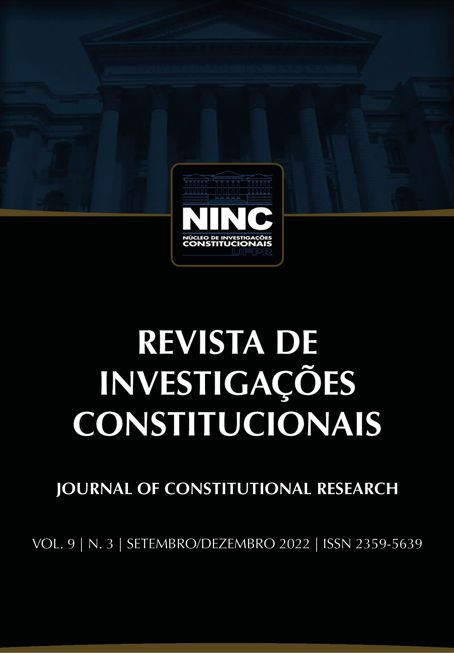Rejoinder to Ayres on defense, punishment and gentleness
DOI:
https://doi.org/10.5380/rinc.v9i3.86477Palavras-chave:
punishment, defense, libertarianism, gentleness, proportionality.Resumo
Ayres maintains that both punishment after the fact of crime, and what the victim is allowed to do during the commission of the crime, should be based upon proportionality. I agree with him on the former contention, but not the latter. This paper is my attempt to make the case that the victim is entitled, based upon libertarian law, to do whatever is necessary to defend himself and his property, provided, only, that he employ the most gentle means compatible with this end. Ayres demurs.
Referências
AYRES, Cedric John. Proportionality trumps gentleness: reforming Block’s evictionism (part I). Revista de Investigações Constitucionais, Curitiba, vol. 8, n. 2, p. 407-433, maio/ago. 2021. DOI: 10.5380/rinc.v8i2.74518.
BLOCK, Walter E. Libertarianism vs. Objectivism; A Response to Peter Schwartz. Reason Papers, Tempe, vol. 26, p. 29-62, jun./aug. 2003. Available at: < https://reasonpapers.com/pdf/26/rp_26.pdf>.
BLOCK, Walter E. Should abortion be criminalized? Rejoinder to Akers, Davies and Shaffer on Abortion. FBIM Transactions, Belgrade, vol. 2, n. 1, p. 33-44, jan. 2014.
BLOCK, Walter E. A libertarian perspective on the stem cell debate: compromising the uncompromisable. Journal of Medicine and Philosophy, Oxford, vol. 35, n. 4, p. 429-448, aug. 2010. Available at: <https://academic.oup.com/jmp/issue/35/4>.
BLOCK, Walter E. A Not So Funny Thing Happened to Me in Tampa. August 30, 2012. Available at: <http://archive.lewrockwell.com/block/block208.html>.
BLOCK, Walter E. Abortion, Woman and Fetus: Rights in Conflict? Reason, vol. 9, n. 12, April, p. 18-25, 1978.
BLOCK, Walter E. Evictionism and Libertarianism. Journal of Medicine and Philosophy, Oxford, vol. 39, n. 3, p. 248-257, jun. 2014.
BLOCK, Walter E. Evictionism: The compromise solution to the pro-life pro-choice debate controversy. New York: Springer Publishing Company, 2021.
BLOCK, Walter E. Forestalling, positive obligations and the Lockean and Blockian provisos: Rejoinder to Stephan Kinsella. Ekonomia Wroclaw Economic Review, Wrocław, vol. 22, n. 3, p. 27-41, 2016.
BLOCK, Walter E. Homesteading, ad coelum, owning views and forestalling. The Social Sciences, Faisalabad, vol. 3, n. 2, p. 96-103, 2008. Available at: < http://papers.ssrn.com/sol3/papers.cfm?abstract_id=1890872>.
BLOCK, Walter E. Human shields, missiles, negative homesteading and libertarianism. Ekonomia Wroclaw Economic Review, Wrocław, vol. 25, n. 1, p. 9- 22, 2019.
BLOCK, Walter E. Judith Jarvis Thomson on abortion; a libertarian critique. DePaul Journal of Health Care Law, Chicago, vol. 19, n. 1, article n. 3, p. 1-17, mar./jun. 2017.
BLOCK, Walter E. Libertarianism, Positive Obligations and Property Abandonment: Children’s Rights. International Journal of Social Economics, Bingley, vol. 31, n. 3, p. 275-286, 2004.
BLOCK, Walter E. Response to Jakobsson on human body shields. Libertarian Papers, Auburn, vol. 2, article n. 25, p. 1-9, 2010. Availabe at: <https://cdn.mises.org/-2-25_2.pdf>.
BLOCK, Walter E. Response to Wisniewski on Abortion, Round Two. Libertarian Papers, Auburn, vol. 3, article n. 4, p. 1-13, 2011. Available at: <http://libertarianpapers.org/articles/2011/lp-3-4.pdf>.
BLOCK, Walter E. Stem Cell Research: The Libertarian Compromise. September 3, 2001. Available at: <http://archive.lewrockwell.com/block/block5.html>.
BLOCK, Walter E. Terri Schiavo. Journal of Libertarian Studies, Auburn, vol. 22, n. 1, p. 527-536, 2011. Available at: <https://cdn.mises.org/22_1_26.pdf>.
BLOCK, Walter E. The Human Body Shield. Journal of Libertarian Studies, Auburn, vol. 22, n. 1, p. 625-630, 2011. Available at: <https://cdn.mises.org/22_1_30.pdf>.
BLOCK, Walter E. Toward a Libertarian Theory of Abortion. In: Rothbard, Murray N. The Libertarian Forum. Volume 2: 1976-1984. Auburn: Mises Institute, 2006 [1977]. Available at: <http://www.mises.org/journals/lf/1977/1977_09.pdf >.
BLOCK, Walter E. Toward a libertarian theory of evictionism. Journal of Family and Economic Issues, vol 35, n. 2, p. 290-294, jun. 2014.
BLOCK, Walter E. Van Dun on Freedom and Property: A Critique. Libertarian Papers, Auburn, vol. 2, n. 4, 2010.
BLOCK, Walter E.; EPSTEIN, Richard. Debate on Eminent Domain. NYU Journal of Law & Liberty, New York, vol. 1, n. 3, pp. 1144-1169, 2005. Available at: <https://www.law.nyu.edu/sites/default/files/ECM_PRO_060927.pdf>.
BLOCK, Walter E.; WHITEHEAD, Roy. Compromising the Uncompromisable: A Private Property Rights Approach to Resolving the Abortion Controversy. Appalachian Law Review, vol. 4, n. 2, p. 1-45, 2005.
DYKE, Jeremiah; BLOCK, Walter E. Explorations in Property Rights: Conjoined Twins. Libertarian Papers, Auburn, vol. 3, article n. 38, p. 1-18, 2011. Available at: <http://libertarianpapers.org/38-explorations-property-rights-conjoined-twins/>.
HAZLITT, Henry. Economics in One Lesson. Auburn: Mises Institute, 2008 [1946]. Available at: <http://mises.org/books/economics_in_one_lesson_hazlitt.pdf>.
ROTHBARD, Murray N. The Ethics of Liberty. New York: New York University Press, 1998 [1982]. Available at: <https://cdn.mises.org/The%20Ethics%20of%20Liberty%2020191108.pdf>.
Downloads
Publicado
Como Citar
Edição
Seção
Licença
Autores que publicam nesta revista concordam com os seguintes termos:- Autores mantém os direitos autorais e concedem à revista o direito de primeira publicação, com o trabalho simultaneamente licenciado sob a Creative Commons - Atribuição 4.0 Internacional que permite o compartilhamento do trabalho com reconhecimento da autoria e publicação inicial nesta revista.
- Autores têm autorização para assumir contratos adicionais separadamente, para distribuição não-exclusiva da versão do trabalho publicada nesta revista (ex.: publicar em repositório institucional ou como capítulo de livro), com reconhecimento de autoria e publicação inicial nesta revista.
- Autores têm permissão e são estimulados a publicar e distribuir seu trabalho online (ex.: em repositórios institucionais ou na sua página pessoal) a qualquer ponto antes ou durante o processo editorial, já que isso pode gerar alterações produtivas, bem como aumentar o impacto e a citação do trabalho publicado (Veja O Efeito do Acesso Livre).
























